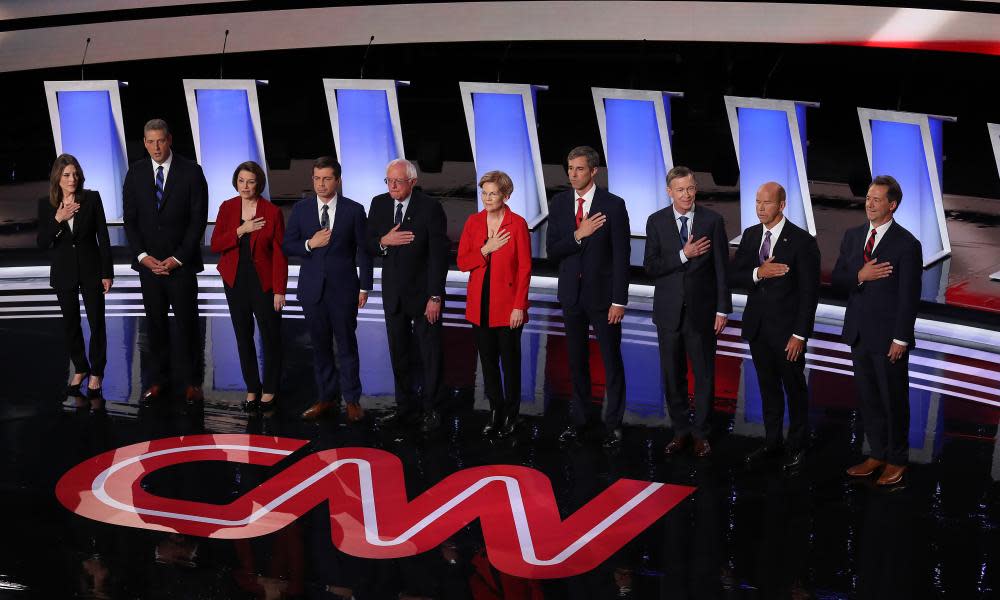The Democratic field is crowded with C-listers. It's time for some to drop out

Millions of Americans don’t know who John Delaney or John Hickenlooper are. They probably wouldn’t be able to correctly identify them in a photo. And yet, at the Democratic debate on Tuesday night, Delaney got to speak for nearly 11 minutes, and John Hickenlooper for almost nine. In one night, those two relatively unknown men combined got more airtime than the climate crisis has in all three debates thus far. And that’s despite the fact that, if we don’t do anything to address rising temperatures now, we will see several US cities underwater in the coming decades.
So here’s my pitch: if these and other candidates without a shot in hell at winning actually cared about the future of this country, they would drop out.
There are plenty of substantive differences among the viable candidates that deserve to be explored in depth, on just about every issue raised at Tuesday’s debate – healthcare, immigration, climate, gun violence – plus many more. And while it’s great for the ratings of networks like CNN, it’s not exactly a boon to American democracy to watch a stage flanked with unrecognizable C-list primary hopefuls pad their own egos because they’re rich or well-connected enough to meet the debate criteria.
That’s not to say that there isn’t a case to be made for long-shot candidates. Though Jay Inslee is unlikely to get the nomination, his detailed climate policy releases are invaluable resources for any future administration and set a high standard for other candidates on an issue that growing numbers of Americans are deeply concerned about.
And I’m one of many that would love to see the Alaska senator-turned-internet-phenomenon Mike Gravel appear on stage and give voice to the millions of teens who are unable to vote. The DNC shouldn’t limit the field with stricter criteria to keep them out. But Delaney and other visionless outliers should have the humility to know that they’re adding next to nothing to the conversation besides hot air. And moderators should have the good sense not to let them drone on, let alone pivot whole debate topics around them.
Related: Who won the Democrats' debate? Our panelists' verdict
Consider the start of Tuesday night’s all-too-brief exchange on climate. In one of a long string of questions that might as well have been crafted by a Republican strategist, the moderator Jake Tapper asked Delaney what he thinks is unrealistic about the Green New Deal, a policy framework that most frontrunners, besides Joe Biden, have endorsed. The result was an extended detour into his half-baked plan for a bipartisan carbon tax and experimental technologies.
You wouldn’t be wrong to say my frustration with Delaney and his ilk is a little misplaced; please forgive the weariness of a politics writer staring down the barrel of another 16 months of the horse race. But if progressives like me are angry with people like Delaney and Hickenlooper – who hold close ties to the healthcare and mining industry, respectively – it’s because they and their friends already enjoy such outsized influence over our political system.
It’s thanks in no small part to the lobbying of the healthcare industry Delaney defended in the debate that America’s healthcare system is as broken as it is, and why this country hasn’t managed to catch up with other wealthy nations in providing care to everyone who needs it. It’s thanks to Hickenlooper’s buddies in the oil and gas sector that we’re only now even starting to have a serious conversation about what it will look like to curb climate breakdown at the scale that challenge deserves.
It’s also for those reasons that Bernie Sanders and Elizabeth Warren’s gloves-off approach to these problems and the millionaires driving them is so appealing, to young Democrats especially. We’ve heard enough from elites dipping their toes into politics when it suits them. Instead, we want candidates who will call the one per cent’s influence over our politics and economy what it is: absurd, undemocratic and even – as Sanders said of the fossil fuel industry tonight – criminal.
Kate Aronoff is a freelance journalist covering climate and US politics

